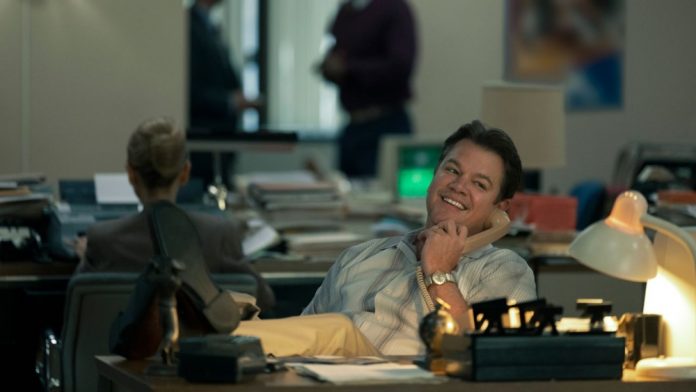Alex Convery went from being an unproduced screenwriter to having sole writing credit on Air, one of the buzziest films of the season, and though his journey through Hollywood has been challenging at times, he has taken the wild ride in stride.
Directed by Ben Affleck, Air premiered at SXSW to overwhelmingly positive reviews before Amazon sidelined its own streaming strategy and released the film in over 3,000 theaters. The film stars Matt Damon as Sonny Vaccaro, the Nike executive who courted future NBA legend Michael Jordan for his own line of shoes — Air Jordans — back in 1984 when he was just a rookie.
Damon is joined by his old pal Affleck, who plays Nike founder Phil Knight, and the Boston boys are joined by Jason Bateman, Chris Messina, Chris Tucker, Marlon Wayans, Matthew Maher, and Oscar winner Viola Davis, who plays Jordan’s headstrong mother.
Convery spent a year writing the script on spec, but he never thought in a million years that it would actually get made. When he got the call that Affleck wanted to direct it, as well as produce and star alongside Damon, he couldn’t have imagined a better outcome for his passion project. Though Convery had already gotten the industry’s attention with a pair of scripts on the Black List, including one about Stan Lee and the birth of Marvel Comics, Air would mark his first produced credit. It almost certainly won’t be his last.
Above the Line sat down with Convery over Zoom for an extensive conversation on the eve of Air‘s first weekend in theaters. He was practically a stone’s throw from where the film was shot in Los Angeles, largely on a set that replicated Nike’s Beaverton, Oregon headquarters circa 1984, and his ability to be there on set during production was just one of the many dream scenarios that came to pass from his spec script.
Above the Line: Take me back to the beginning of this project and what initially inspired you to write this screenplay. Where did you think, or hope, it would lead?
Alex Convery: I was an unproduced screenwriter who was relying on specs. I’d had two scripts on the Black List and I was booking some paid work, doing some rewrites, and I was just at a point where I was stuck, honestly. One of those scripts on the Black List was a biopic about Stan Lee and Marvel Comics and Jack Kirby.
That ended up being kind of a heartbreaking process where the script was kind of close to going and fell apart for all the reasons a spec biopic falls apart, like rights reasons. So I was like, ‘I’m not gonna do that again. I’m not going to spec something about a true story. I just have to come up with something original.’
So there I was, watching The Last Dance, like everyone in those early months of quarantine. And in Episode 5, there’s a brief segment on the Jordan-Nike deal, and how it should never have happened. Nike was just this third-rate jogging company at the time. Adidas and Converse were obviously at the top of the pack and should have landed Jordan. It was nothing grander than I just thought, “Man, that’s really interesting.”
ATL: So you took a brief segment from the docuseries and set out to write about it?
Convery: Yeah, I thought it could be a movie. But you put so much time and effort and heart into these things and it can obviously just get grinded out of you when these things don’t happen. So I was cautious about pursuing it, but I just started researching. I had known about Sonny [Vaccaro] because I was the assistant for one of the producers on the 30 for 30 [about] him — [Sole Man]. So I had known the backstory of Sonny’s involvement in the deal and thought there was a very interesting narrative engine for the story.
It has all the Screenwriting 101 stuff you look for, like an active protagonist, very clear stakes, a hard-to-achieve goal, [and] a ticking clock. It just all kind of clicked. I did a ton of research on Sonny, and read a ton of great books on Phil Knight, including his book, Shoe Dog. David Halberstam‘s Playing for Keeps was probably the most influential. On Nike, there’s a great book called Swoosh [that was] written by Rob Strasser‘s wife, [the wife of] Jason Bateman‘s character in the movie, which [tells] the unauthorized history of Nike. So I just started, and this was just kind of, like, a nights and weekends thing. Whenever I had some free time, I’d just do a little more research and compile some notes.
ATL: What were you discovering as you went through your research process?
Convery: The more I dug into the story, the more things I liked about it, and [the more I] found Sonny to be a really dynamic character. But it was an interesting angle into Phil Knight’s story, too, where it’s not like the [Nike] origin story, but almost the opposite. In 1984, they had just gone public and that’s the goal of any company, right? But it actually hurt them. So I just saw it as an interesting moment in time to look at Phil Knight and then the rest of the cast of the characters, whether it was Strasser, who had been at Nike for a while and was kind of like Phil’s secondhand field general, or Peter Moore, who designed the first [Air] Jordan.
I kept peeling back the layers and this wonderful kind of ensemble developed, ultimately leading to Deloris [Jordan] becoming the beating heart of the movie. In terms of writing it, it’s a structured story, [so] I just knew where I was in the story and it didn’t need extensive world-building or set pieces or stuff like that.
ATL: Did you enjoy working on this side project of yours during the pandemic?
Convery: It was fun to write. It took me about a year, starting in the late summer of 2020 and finishing in late July/early August of ’21. And then I told my reps, ‘I know you’re gonna kill me because I did the one thing I promised I wouldn’t, which is spec another one of these true stories.’ But I thought it would be a good writing sample and it would get my name back out there, get my work back out there, and maybe put me up for jobs on similar types [of] movies.
ATL: It sounds like you weren’t too confident this would actually get made then?
Convery: Well, to my reps’ credit, they said, ‘This is going to be nearly impossible to make, but let’s give it a go and let’s send it to some places that might actually have the avenues to explore making it.’ That’s really how we ended up at Mandalay, [which] had made The Last Dance, and then Skydance, [which] had a tangential relationship with Sonny and also was looking to invest in scripted sports content.
And it was just perfect timing. So they came on board, optioned the script, and then I met with Sonny and his wife, Pam, and [we] went through the script and the story as it was. And then over the holidays of 2021, we took our dream shots [at] stars and directors. Ben was obviously one of those A-list, top-of-the-top choices, and after he had read it we got a call from the producers and set up a meeting, so that’s how it all started.
ATL: You must have been thrilled at that point.
Convery: Yeah, I was excited, but I’d been down this road before [with] some other scripts, where it’s like, just because an A-list talent wants to sit down and talk about the script, that doesn’t mean the movie’s greenlit. It doesn’t mean really much of anything other than if they come on, then it obviously makes a big difference. I’ve kind of built a resistance to trying to dream too big on this stuff because I’ve been disappointed so much in the past.
But from that initial meeting, Ben really had a vision for the movie and how he wanted to do it and he let us know in that meeting that Matt had read it and wanted to do it. So, to have the two of them [was] just a dream scenario for when you start out [writing] one of these [spec] scripts. You always hope and kind of dream it could get to that point, but it just so rarely does that.
On top of all of it, Matt and Ben were starting Artists Equity, this new production company where they have a real focus on making these types of movies — [the kind of] mid-budget, adult dramas that we all grew up loving, but [which] don’t get done very much anymore. So it was just really perfect timing all around, and obviously, a lot of themes in the movie are about investing in individuals rather than in corporations. And the question of who gets a piece of what is very much central to what they’re trying to do with Artists Equity.
ATL: Alex, you were on set during production, which took place in L.A., and that’s a privilege that not many new writers get. So what was that like for you?
Convery: Oh, it was super exciting. Just as a film nerd, first and foremost, it was just a dream to be on a set of that caliber with Ben directing and Bob Richardson shooting the movie. It’s just top-notch, from top to bottom. But at the same time, it was like showing up for work, and you have a job to do and you want to do it well. [But] I wasn’t sitting on the set furiously writing. A lot of it was watching it all come together.
We were lucky to shoot in L.A., too. It was 10 minutes from where I’m sitting right now. But you hear all the time [that] a movie is made three times. [First], you write it, then you shoot it, and then you edit it. And this [was] just a real lesson [in] how much creation can come from just kind of chasing the best idea in that moment. Sure, you can shoot a script exactly as is, but why not have the performers explore a little bit? That’s to Ben’s credit. There’s a ton of that in the movie, and it’s really all for the better.
They built out a set that was Nike’s full office building in 1984. So it was cool to have access to that and it gave everyone the ability to say, “We’re gonna shoot this scene here instead of there because it looks better.” Or, “We finished this scene early, let’s just go try this other scene upstairs.”
ATL: I understand that Ben, Matt, Chris Messina, and Chris Tucker did a little bit of uncredited writing as well, right?
Convery: Really, the most important part of this process was [that] Ben went and met with Michael Jordan to get his blessing [for] the movie. And it ended up having a ton of influence on the final film because as Ben and Matt have talked about, he had had some things he really felt were important to the movie, like Howard White, who is Chris Tucker’s character. Chris came on and he knew Howard White, so he was able to talk to him and get these firsthand accounts and really build that character from the ground up and insert him into the structure of the story we already had, which [was] such a blessing to the finished movie.
This is a movie of conversations and phone calls and late-night conversations, so there was just a lot of energy and improvisation. With Chris Messina’s phone calls, he would keep notching it up a level and it’s hilarious in the movie.
Ben and Matt, they’re great producers. Viola and Julius are great producers [as well] and have a great knack for story. Jason Bateman, obviously, same thing with Ozark and his company. They’re all funny, so a lot of the humor in the finished movie was just captured in the moment on set. I love the kind of humor that was brought to it. It feels much more lived-in and human.
ATL: So with all these helping hands offering input on the script, how did you feel as the writer of the original screenplay?
Convery: As an unproduced screenwriter, you don’t necessarily expect to be treated with respect. I just thought I would disappear from the production and share credit at the end. But on the last day of production, Ben pulled me aside and said, ‘We’re not gonna arbitrate. This is your story, your idea. And, we want to respect that. Coming up as writers, a lot of people paid it forward for us. And, this is our way of paying it back,’ he told me. It says a lot about them. It’s easy to kind of talk the talk, and much harder to walk the walk, [but] that’s actions speaking louder than words in a lot of ways.
ATL: Chris Messina plays MJ’s agent, David Falk, and his phone calls with Sonny Vaccaro are so funny. Do you find that audiences really enjoy their verbal sparring matches?
Convery: It was really cool to see how Ben shot that. Most of the time when you shoot phone calls, you shoot half of the conversation, and then you move and shoot the other half. But all the phone calls in the movie are the actors and actresses actually on the phone with each other. They would be on different sets. It makes those scenes so much more alive than I think they would’ve been otherwise when you just shoot half and then go shoot the other half and try to piece it together in the edit.
ATL: What other input did Michael Jordan, who was originally a diehard Adidas fan, give regarding how he wanted the story to be told?
Convery: It was adding the Howard White character and then George Raveling, who Marlon Wayans plays. Jordan felt it was really important for him to be included. His name was thrown about in the original script because it takes place after the Olympics, [and] Raveling was his Olympics coach, but Jordan really wanted him depicted on screen. So that was added.
And then the final thing was, he wanted Viola Davis to play his mom, which was a great idea. You know, we all would love that. But it’s not so easy to just go get Viola Davis. You’re talking about, like, the best performer on the planet. So, we were lucky to get her. She is ultimately the beating heart of this movie and a gravitational pull, kind of like the sun of the movie’s solar system. I could watch her scenes from this [film] forever. It’s a very special, stunning performance.
ATL: Michael Jordan himself, or at least his face, is never shown in the film outside of archival basketball footage.
Convery: You either go make the Michael Jordan biopic or you don’t. For me, in the writing, it was always [about] letting him exist kind of above all this in the background — always being talked about [and] kind of ever-present. I mean, he’s the focus of the movie. I just thought [that] to try and write him as a character would [make it] feel almost inauthentic unless he was the true protagonist of the movie.
You don’t want the audience to think he’s going to be a central character. Michael Jordan’s one of the most famous people on the planet. You can fake Matt as Sonny Vaccaro [and] you can fake Ben as Phil Knight, but it’s much harder to turn the camera on someone and ask the audience to believe that, “Hey, this is Michael Jordan.” So, to me, it’s almost out of respect that the only time you see him is as he was in the footage playing basketball [and] winning championships.
ATL: Tell us more about Ben playing Nike founder Phil Knight and that character.
Convery: A lot of the movie is about Sonny getting Phil Knight to almost reembrace the early principles that built the company. In reading his book Shoe Dog, there’s a lot of Buddhism and Eastern philosophy that Phil talks about, and Ben ran with it. I think it’s a really funny performance, first and foremost, which I love. I respect that he’s not afraid to poke fun at the character, who’s also supposed to be a little aloof and out of touch, in a way. But he’s the one who makes the ultimate decision [in] the end — the person who has to say “yes.”
ATL: You had a big premiere at SXSW, and Air has just opened in theaters. What kind of feedback are you receiving and what has this whole experience been like for you?
Convery: Starting with SXSW, it was just so fun to finally see the movie with a crowd. You spend all this time writing it, making it, [and] watching the director’s cut and the test screenings, so to finally be able to share it with a packed theater — I’ll never forget that screening. It just played through the roof and you realize that the big moments are playing. There are moments that go from levity to those that are really touching on something deeper. It was cool to feel the crowd go on that ride and not be able to hear some of the dialogue because they were laughing so loud. That’s what you do it for, so to be able to share this one with the world [has been] really special.
But at the end of the day, once you put something out there in the world, it’s not yours anymore, so however it’s going to be received, it’s not my place to say. The cool thing has been to see that people are excited about it and behind a movie like this that doesn’t [often] get put out theatrically anymore. There are no explosions or guns or superheroes. It really is, like, a pretty small human story, but done on a big scale because it has a bunch of movie stars in it and was made by an A-list cast and crew from top to bottom.
ATL: What’s the number one thing you learned from this experience, Alex?
Convery: The main takeaway is just listening to your gut. I was so ready never to spec another true story again, but the more I researched it, the more I felt this was a story that should be told. I loved the story and I loved the characters — and more than anything, I had fun writing it, and I think that fun showed up in the script. I heard from a lot of people that it was such a fun script to read. I think sometimes we forget screenplays are written documents that are meant to be read first, especially a spec script. Knowing the odds of getting this made were unlikely actually made me focus more on the page, and having it be a page-turner.

ATL: There’s another ingredient that’s part of the recipe here, and I think it’s Chicago.
Convery: Yeah. I mean, look… I was a kid in the suburbs of Chicago in the ’90s, so, like, the Bulls were [my] life. So my earliest memories are watching them with my Dad [during] those six finals runs. I always say, ‘I wish [I’d been] 10 years older then,’ so I could actually have appreciated Jordan more, but I was six, seven, eight years old, and you don’t have the context for anything at that time. So it’s like, “Oh, the Bulls will always be winning championships,” but no, it doesn’t work like that. When they say “write what you know,” there can be a very literal translation of that, writing about where you grew up. For me, that translated to: “I know the Bulls and I know Michael Jordan.”
ATL: But you are not necessarily a sports movie guy, right?
Convery: No, I actually tend to not like sports movies. Part of it is that I’m such a big sports fan and it’s nearly impossible to re-create the experience of watching a game in a movie. I find a lot of them to be kind of Disney-fied and pulling at your heartstrings and there’s always a place for that and a reason [why] that genre still exists.
But for me, that’s what makes the best so great, like Moneyball, Bull Durham, and Friday Night Lights. [Because] the key to sports movies, like any good movie, [is] the characters. If your dramatic stakes are “What’s the final score of the game going to be?” then it’s not going to work. You need to be along for the ride with a strong character, so that’s what I look for, first and foremost, whether it’s a sports movie or not.
ATL: Did you ever consider Air as a multi-part series?
Convery: Um, not really. I obviously wrote this spec as a feature, and movies are kind of my first love. But when you’re exploring an idea with a production company, you talk about all the different hypotheticals, right? So yeah, there were one or two conversations with Skydance and Mandalay [about], “if we don’t get a movie star who wants to do it, maybe we explore it as a limited [series] and blow out a longer story about Sonny and his career and the Nike side of it all?” But luckily, we got our first choice, really, when it came to [both the] filmmaker and star.
I think the line between TV and movies is thinner than ever. Movie stars are doing TV shows and TV stars are leading movies, and you have A-list talent in front of and behind the camera working in both mediums. So almost any movie could be a limited series. It’s [just] a matter of what’s the right medium for the story, and it’s [also] very much about the deal and whether it’s going to get done.
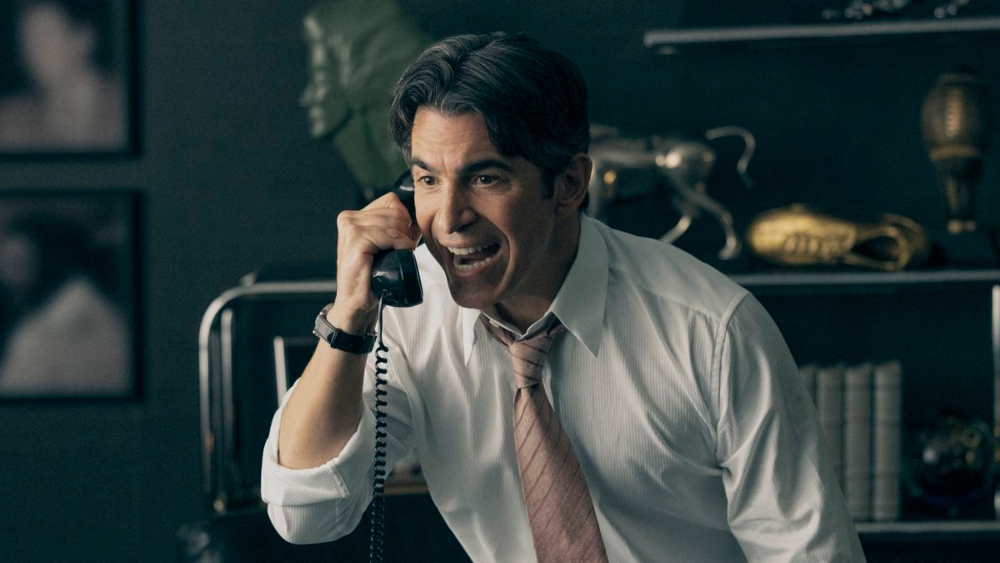
ATL: Well, Air is a great film, but let me dream for a second. Chris Messina’s character, David Falk, completely reminded me of Entourage and Jeremy Piven’s beloved character, Ari Gold, and I’d be down to watch a limited series about that guy. He was basically the ’80s version of Ari, but for sports, right?
Convery: Yeah, totally. I think it’s a credit to Chris and [his] performance. When you think about supporting characters, you want to [be able to] say, “If you just turn the camera a different way, the movie could be totally about them.” This [film] is from Sonny’s point of view and that was the choice. But you want all the characters to have their own hopes and dreams and goals and problems. When I’m building out an ensemble, that’s always top of mind — trying to make each character have their moment and have their kind of inner life. We had fun with the agent. Working in Hollywood, obviously, it’s easy to take shots, and it’s been funny to watch the movie with my agent during those scenes — and they were fun to write [as well].
ATL: Speaking of characters in real life, is there anything going on with your Stan Lee script? Any updates?
Convery: It’s a story I love and it’s something that is ever-present in our lives today, in terms of Marvel. Just like Air, it looks at the people behind this [successful company] and how it came together and why. I’m confident there will be a movie about Stan Lee and Jack Kirby one day, whether it’s my script or someone else’s — it’s too good a story [not to do it].
ATL: And finally, before I let you go, what about your other Black List script?
Convery: Bagman? I have a producer and we have a star for the lead, so we’re working on it. It’s a little bit tougher because it’s more of a sports movie than Air. College football is really interesting because it’s a very American thing — there’s no such thing as college sports overseas. [But] it’s another story I love.
This is very much looking at the underbelly of college sports. It’s a crime movie set in the world of college football and the guy who’s paying players under the table and trying to hold everything together. On the other end of it, there’s an NCAA agent who’s tasked with finding him in a cat-and-mouse, cops-and-robbers-type deal.
Air is now playing exclusively in theaters and will stream on Prime Video at a later date.


